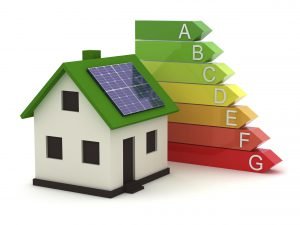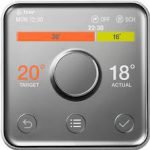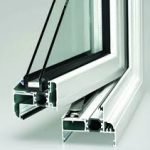
At Pay4Property we try to do our bit for the global environment. We already generate much of our own electric via solar and use an electricity supplier who only uses 100% renewables so we are as kind as we can be to the environment. All our houses are fully double glazed, insulated as well as possible and most have energy efficient LED lighting.
All our properties use gas boilers for central heating and hot water as due to the age of the houses it’s not possible or economic to use a heat pump, however all the boilers are modern condensing boilers ensuring they are as efficient as possible and output the minimum amount of Co2.
From Summer 2021 we started a program of de-carbonised local generation where we are aiming to have all our properties generating 70% (or more) of their own electricity through solar PV. Our first property went live in December 2021 with 8.7 kWp of solar PV and a 13.5 kWh Tesla Powerwall. Currently the average UK solar PV system is 3.5 kWp and has no battery storage so we are going the extra mile to de-carbonise our own useage and hopefully also help others by pushing solar energy back to the grid.
In 2022 we installed a further 14.4 kWp of generation on 2 of our largest properties bringing our total generation capacity to 23.1 kWp of solar panels which in an average year should generate around 20,000kWh per year. To put that in perspective, that’s enough to power 5 average houses on 100% sunshine!
For 2023 we already have plans to install solar generation to another 3 of our properties.
We also encourage our tenants to each become more eco-friendly and to play their part in reducing the effects of global warming! If we all play a small part, we can make a big difference!
Bills Included
All our tenancies are “bills included” but as you’re probably aware there is a limit set on how much is included and you may need to pay for aything over this amount. For nearly a decade whenever energy costs have increased it has only been by a manageable amount so even if that’s taken the bills a little over the limit we have absorbed that and have never asked a tenant to pay extra for their energy.
Unfortunately the recent HUGE increase in energy costs from October 2021 means that this increase is far too large for us to absorb indefinitely and if the government reduces it’s energy support it may be necessary to ask tenants to pay for energy bills over the limit. This makes it even more important for our tenants to be sensible with their energy usage because not only does it help the planet, it will now have a direct impact on how much extra you may need to pay.
Be sensible with your heating
  | All our central heating systems are set to maintain the house at an average of 21 degrees, the government and WHO recommended temperature for living spaces. You can turn the over-all house temperature up or down from 21 degrees using the main house thermostat which controls when the boiler is on. Turn the central knob clockwise to increase the target temperature and anti-clockwise to reduce the target temperature. When the thermostat detects it’s under the desired temperature it will turn on the boiler to heat the house until it reaches the desired temperature. This is measuring the temperature at the house thermostat not in your individual room. Turning this thermostat up to a high temperature doesn’t make the house heat up any quicker and it should never really be necessary to change it from the 21 degree setting. You can control the individual temperature of your room with your radiator thermostatic valve. The government recommended temperature for comfortable sleeping is around 18 degrees so we recommend you turn your valve down to 3 in the night to reduce the temperature and have it at 4 or 5 in the day to return the temperature to around 21. If you are sitting in a t-shirt and shorts with your heating on full blast you are contributing to global warming and potentially costing yourself a lot of extra money unnecessarily. England is cold; you are definitely going to have to use central heating to keep your house warm in the colder months. However, we can all improve on our use of gas and electricity when it is not necessary. Ask yourself a couple of sensible questions before before turning the heating up! Are you wearing adequate clothing; should you put on another layer of clothing or get a blanket? Are all your doors and windows closed to keep heat in? By thinking first you’ll see a reduction in your bills and also will relinquish your reliance on expensive, high carbon energy dependent heat sources! |
Ventilation
 | All our houses have energy efficient double glazing. This is less draughty and warmer than standard windows and helps prevent heat escaping from your room. To maintain a healthy environment we do however recommend that you open the window for a few minutes every day to let in some fresh air and let out excess humidity. It’s important to let out the humidity as constantly high humidity can cause black mould which is not good for your health. If you room feels “sweaty” that’s an indicator of high humidity and openning your window for a few minutes every day will help to sort this. It’s particularly important to control the humidity if you have an ensuite shower room as showering creates a lot of steam. Always ensure the ensuite extractor fan is on while showering and for at least 10 minutes afterwards. If your room still feels humid then open your window for a few minutes. Many of our windows have trickle vents at the top that allow a small amount of air in and out even when the window is closed. You might want to close these vents in the depth of winter when it’s really cold outside but we encourage you to leave them open if possible and especially in summer as they help keep the air in your room less humid and more heathy. In winter (or when it’s below 15 degrees outside) when the heating is on you should only open your window for a few minutes to let out the excess humidity; any longer and you’re simply wasting heat and potentially costing yourself money. In summer we encourage you to open your windows more but remember to lock them again if you are going out! |
Reuse and Recycle
 | Be proud to recycle. Recycling and reusing old products is one of the most dramatic things an individual can do to reduce their personal carbon footprint. Plastic is a killer! By investing a little money in reusable water bottles or taking a backpack with you when you go shopping contributes to the reduction of overall plastic waste. Remember that for every single thing you recycle that is one extra item not going into a landfill. Separate your recyclable waste and put it in the green bins provided. The green recycling bins and the normal black waste bins are emptied by the council on alternate weeks so make sure you leave the right bins out for them each week. |
Switch of lights and switch appliances off at the mains
 | Many of the lights in the corridors and shared areas of our houses are now on motion detection switches meaning that they come on when you enter the room / corridor and go off automatically after a while when no motion is detected. If your house doesn’t yet have motion detection lighting then please remember to turn off lights in kitchens and common areas when you leave. Please remember to turn off your bedroom lights when you leave, or if you you are the last person in a shared room like the kitchen, bathroom or living room. For other devices, turn off your plug switches at the mains; there is no need for your Computer, TV, Laptop, phone charger, PS4 & Xbox to be on standby. This is an unnecessary use of electricity which is contributing to extra supply and demand issues which in turn exacerbate the problems for green energy companies. Every little counts, inactive devices can take a considerable chunk of a household electricity budget! |
Don’t over fill your kettle
Overfilling your kettle is a waste of both water and electricity. If you’re only making one or two cups of tea or coffee, there is no need to fill your kettle right up to the brim. Boil just enough water to make however many drinks you need. Most kettles hold enough water for about 6 mugs so if you always fill it before boiling you’re wasting about 5 times more electricity than you need to and wasting your time as a full kettle takes several minutes longer to boil than a kettle with just enough for 1 or 2 cups. Kettles use a lot of energy.
Use less water
It can be tempting to take long showers, or to leave the tap running when brushing your teeth but this is seriously contributing to our overuse of resources. Using more than we need is a significant contributor to climate change. Having a long bath or shower is great, just make sure you use in moderation. We install energy and water efficient showers in all our houses to try to help minimise the wastage and we recommend a shower time of around 4 to 5 minutes.
Avoid wasting food
Plan your food. If you are not very good at planning or cooking, get better! The internet is full of easy to follow recipes which will massively improve your diet and help you save money. Make sure you do not waste food, store it or freeze it for another day. Make big pots of food and eat throughout the week or freeze it in portions. This will help your budget and also help with your waste minimization!
Dry your clothes the old-fashioned way
Some of our houses have tumble dryers which are very convenient, but are also terrible for the environment! If it is good weather make sure you are drying your laundry outside – it will save on electricity and smell great! Try to limit your use of a tumble dryer, only use it when necessary and don’t become lazy!
Walk, bike or use public transport as much as possible
One massive contributor to global warming is the emission of fuel from cars and buses. One way to cut the amount of fuel emitted is to cut the number of cars on the road. Always choose the right option – if you can walk then do so, short journeys in a car are one of the biggest contributors to carbon output. Try car-sharing, using public transport, cycling or even walking before the easy option of getting in your car.
